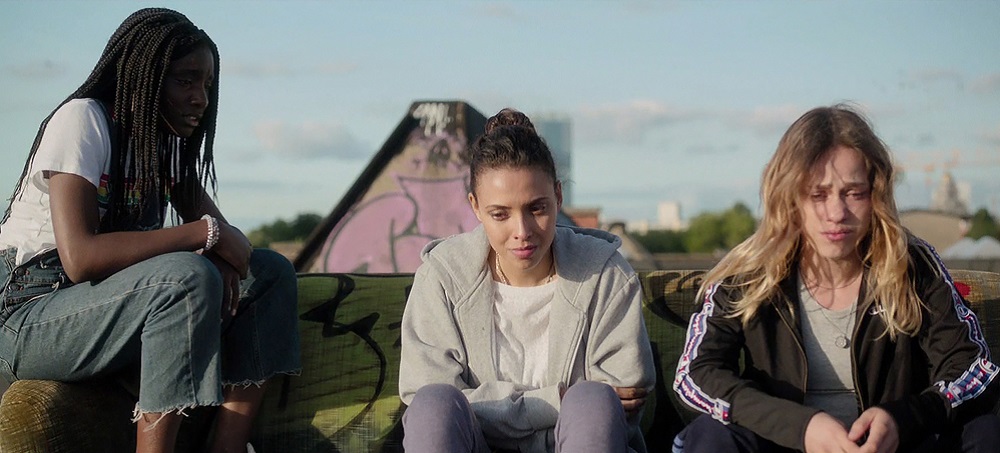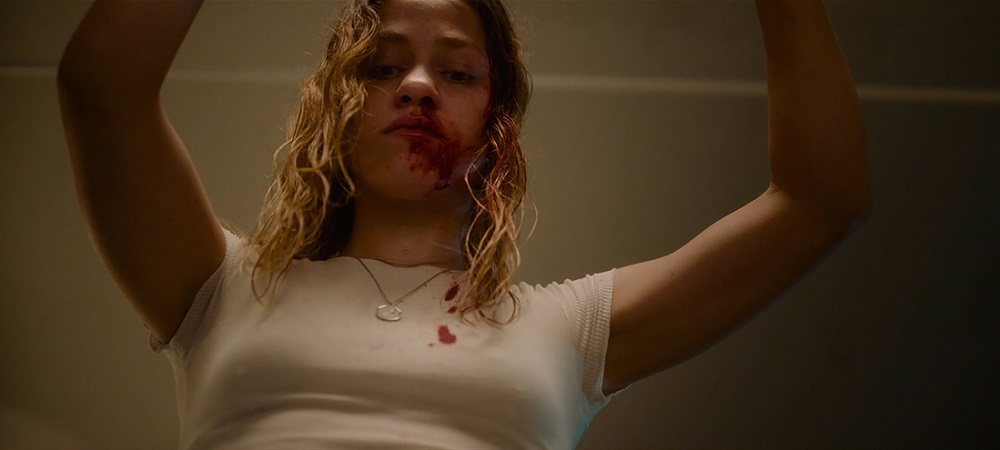Under the Hoof of the Merciless Kandisha
Julien Maury on a Moroccan myth, and what scares him
By Richard Whittaker, 2:30PM, Tue. Aug. 10, 2021

With its cast of teens evading a supernatural threat, Kandisha may seem like a traditional horror: But appearances are deceiving. Writer/director Julien Maury called it "the opposite of the classic slasher. ... The boogeywoman is not going to kill the three protagonists, the three girls. She's killing only men."
His fourth film with Alexandre Bustillo (with whom he wrote and directed French Extreme classic Inside, the unreleased-in-the-U.S gorefest Livid, and teen nightmare Among the Living) melds a Moroccan legend into modern French street culture when three young graffiti artists in Paris summon Aisha Kandisha, a spirit of vengeance unleashed by women harmed by cruel men. Yet the demon is not discerning in her wrath, and the trio must find a way to stop her before she kills all the men they know.
Austin Chronicle: Kandisha fits with a new wave of supernatural horror, like The Vigil and The Djinn, which center on Jewish and Middle Eastern mythology - and that's a welcome change from all the repetitive Catholic horror. Where did you come across the story of Aisha Kandisha?
Alex brought that story to me, because he grew up in a neighborhood with a lot of mixed culture. We have this thing where we ask our friends, "What frightens you the most?" It's always funny to hear what people answer, because of course there are primitives fears that are common to every culture. But there are also fears that are intimate and private. Each time Alex asked his Moroccan friends what frightens them the most, each time they answered "Aisha Kandisha."
Aisha Kandisha is a typical Moroccan story, the equivalent of Bloody Mary or the Lady in White. ... She looks like a creature you find in different cultures. She's the mermaid, she's the harpies, the succubus in Eastern Europe. So she's this universal creature with its own mythology, and we felt it was really scary to imagine this woman wearing a veil and you don't know her appearance, you don't know what she looks like, you just have these goat legs.
Since I've known Alex, for 15 years, he's been talking about this Aisha Kandisha, and we've always gone, "One day it would be cool to write a story about her." So one day we had the idea to put this ancient boogeywoman into this modern environment.
AC: So you've said you've asked a lot of people what scares them - what frightens you?
JM: I think what frightens me the most is something really classical. It's just being old. Just the fact of seeing your body change, and still having a young mind. I'm really frightened of bein stuck in a body I don't recognize.
AC: The film presents France as this very diverse country where an incredible number of influences merge. I remember visiting Paris in the '80s, and you could see how quickly hip hop culture had been adopted, and here so many of the characters are migrants who have brought their own cultural elements - including Aisha Kandisha.
JM: During the scriptwriting, the mix of the cultures, the mix of influences was natural for us. It wasn't a way for us to try to highlight this aspect, because we know that sometimes politicians try to make believe that French culture has its own identity and it's never going to change, but the pop culture is absorbing everything from every country and every culture. the culture of the streets, for the graffiti and the tags, it has been mixed with the French style. It's the same for music, it's the same for art in general. So when we worked on the script for Kandisha, it was just a way for us to try to reflect a sort of reality. Because, in this kind of neighborhood as in any city all over the world, the fact is that immigration is a real asset. We know people from the streets, and how they build their own references and their own culture. They're taking pieces from one thing and pieces from other things, and they're creating their own mutual references.
So what we tried to do was be more accurate in our description of this youth - because we are not so young any more. We worked a lot with our young actors to be on the right page.
AC: Were there any times where you got to set and they basically told you, "OK, old man, what were you thinking?"
JM: We have written a lot of jokes that we thought were relevant and funny, but when we arrived on set and did some rehearsal, and we felt old.
The thing is that we're not the kind of directors that are convinced that they own the truth, and that their vision is above everything. We love to work with our team, with our crew, with our technicians, and everyone is more than welcome to bring their idea and their feelings. Of course, we know where we are going and what we are trying to show, but especially with actors we love to involve them in the creative process.
That's why we've taken non-professional actors and did almost a street casting. We've seen hundreds and hundreds of talents, because we were looking for people that would be closest to what we wrote.

AC: That kind of casting can be a challenge, because it's not like you're casting a couple of stars and then filling in around them, you're looking for an ensemble. Was each casting decision independent, or was there part where you went, "OK, now this makes sense, everything locks around this."
JM: This kind of budget did not allow us to cast well-known or famous actors, and that was important for us because the story was about the friendship, and the legend of Aisha Kandisha. So it was not important to have known faces.
What was important for us was to make the audience believe that they are close friends, they are almost like a sorority. We had some issues during the casting process because we felt, well, this one is going to fit very well with this one, but the third one, it's not matching, and this one is too shy and she's going disappear because this one is too talkative. The balance was complicated to find.
When we found the character of Amélie, played by Mathilde Lamusse, we felt that we could build the group around her more easily. She had this energy that was really particular, and we felt that we had to find fitting energies - one more shy, one more active.
It was different for the guys ...
AC: How so?
JM: We had this trio as the lead, but with the guys it was really tricky because they were going to be the victims and the ones who were going to die. We didn't want to have too many exposition sequences, we wanted to go straight to the action, and it was really clear from the beginning that we needed to have empathy towards the guys very quickly.
Kandisha is streaming on Shudder now.
A note to readers: Bold and uncensored, The Austin Chronicle has been Austin’s independent news source for over 40 years, expressing the community’s political and environmental concerns and supporting its active cultural scene. Now more than ever, we need your support to continue supplying Austin with independent, free press. If real news is important to you, please consider making a donation of $5, $10 or whatever you can afford, to help keep our journalism on stands.
June 27, 2024
June 28, 2024
Shudder, Julien Maury, Kandisha, French Cinema








